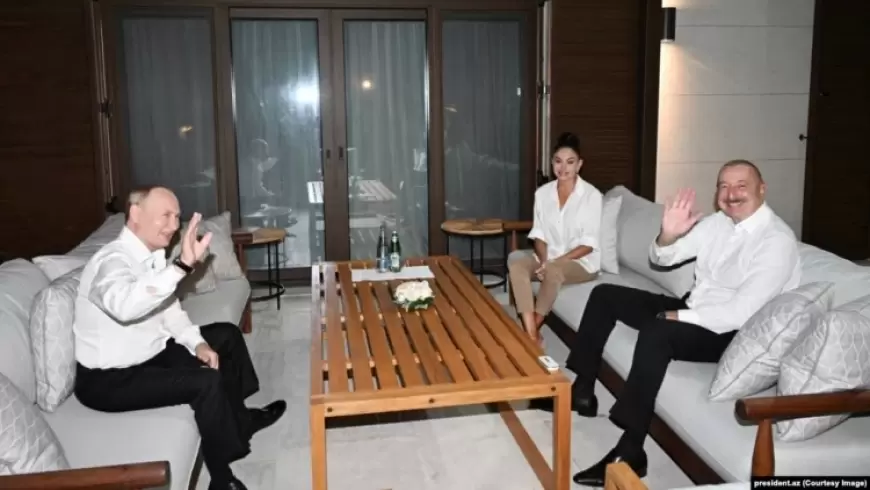Why did Putin come to Baku and what does he want?

"Stability and security across the entire South Caucasus region depend significantly on close cooperation between Russia and Azerbaijan." According to AZERTAC, this was stated by Azerbaijani President Ilham Aliyev during a press statement with his Russian counterpart Vladimir Putin on August 19.
The head of state noted that issues related to regional security were extensively discussed during the limited-format meeting. Aliyev emphasized that Azerbaijan and Russia act as allies, friends, close partners, and neighbors.
Russian President Vladimir Putin stated that stability in the South Caucasus fully aligns with the fundamental interests of all states and peoples in the region. He also mentioned Russia's potential mediation in the peace talks between Azerbaijan and Armenia, saying that Moscow would "provide comprehensive assistance to the signing of a peace agreement between Azerbaijan and Armenia."
“We are also ready to assist in the delimitation and demarcation of borders, taking into account relevant documents that have remained since the Soviet Union, the opening of cross-border routes, and the establishment of humanitarian contacts,” he added.
Putin arrived in Azerbaijan on August 18. Two years earlier, on February 22, the heads of state of Azerbaijan and Russia signed a "Declaration on Allied Interaction" in Moscow, which highlighted the importance of developing cooperation between the two countries in political, economic, and various other fields.
Former Member of Parliament Sabir Rustamkhanli told Turan that during Putin’s visit to Azerbaijan, several documents were signed to maintain relations between the two neighboring states at a high level: "However, regional issues were also discussed. The West is slowly advancing towards Russia’s borders through Ukraine, and within Russia itself."
According to him, Armenia is being armed and is moving out of Russia’s control: "Russia has no power to influence Armenia. All of this causes serious concern in Russia." Rustamkhanli believes that the South Caucasus is gradually shifting towards the West: "In such a situation, Azerbaijan’s stable position and desire to establish normal relations with both the West and Russia increases its respect. Therefore, Russia strives to maintain its relations with Azerbaijan at a high level."
He also pointed out that Azerbaijan supports Ukraine’s territorial integrity and has repeatedly declared this: "On the other hand, we maintain warm relations with Russia, which has its eye on Ukrainian territories. This is not well received globally, and Europe’s trust in Azerbaijan may diminish as a result. However, Azerbaijan has seen the other side of Europe; for years, Europe stood by the occupying Armenia, and it still does. Therefore, Azerbaijan must maintain normal relations with its neighbor Russia, at the very least because nearly 3 million of our compatriots live there."
Elkhan Shahinoglu, head of the Atlas Research Center, believes that the presidents discussed three main issues during their limited-format meeting: "The first topic is the expansion of the capabilities of the 'North-South' transport corridor. Due to sanctions imposed on Russia for its invasion of Ukraine, it cannot sell goods to Europe. Therefore, Russia has increased its focus on expanding the capabilities of this transport corridor to gain access to Asian markets via Azerbaijan and Iran."
According to the expert, gas was the second main issue for Putin: "Due to the war against Ukraine, Russia cannot sell large volumes of gas to Europe. Now, after the Ukrainian forces’ attack on Kursk, they have taken control of the Sudzha gas distribution station, and Russia can no longer sell the small amount of gas it was still exporting. Therefore, the Kremlin may be considering the option of selling gas to Europe through Azerbaijan."
He believes that if Europe agrees to this arrangement, Azerbaijan could potentially sell Russian gas through its own routes. The political analyst also mentioned that the third issue discussed was the situation in the region: "Putin sees that Russia is now becoming sidelined in the South Caucasus. During recent negotiations between Azerbaijan and Armenia, two countries—Germany and the U.S.—acted as moderators. Therefore, Moscow wants to regain its role as a mediator. However, Armenia is not willing to accept this. Armenia’s refusal to accept it works in Azerbaijan’s favor."
The political commentator suggests that Moscow has an interest in the "Zangezur corridor" (a route expected to pass through Armenia’s Syunik region): "Russia wants this corridor to open and be under its control. This is against Azerbaijan’s interests. The 'Zangezur corridor' is part of the Middle Corridor, and if Russia gains control over it through Armenia, it will effectively control the Middle Corridor route."
Azar Gasimli, head of the Institute for Political Management, told Radio Liberty that the main issue discussed at the meeting was: "Vladimir Putin turned a blind eye to Azerbaijan’s liberation of Karabakh, and it appears that this was based on certain agreements. The trilateral statement signed on November 10, 2020, also indicated that Russia’s main interest was the opening of the 'Zangezur corridor' and placing it under Russia’s control. This is the main reason why Putin came to Baku."
The political commentator believes that the second issue discussed was the sale of Russian gas to Azerbaijan: "Perhaps they briefly discussed this as well. But that was not the main topic. The question is, how much gas can Azerbaijan increase in its supply to Europe? Everyone knows that Azerbaijan can currently sell a maximum of 20 billion cubic meters per year, and in the future, 30 billion cubic meters. If it sells more than that, it will be clear that it is Russian gas. How the West will react to this is unclear."
According to Gasimli, Russia is interested in escalating tensions between Azerbaijan and Armenia: "Russia tried to bring pro-Russian figures to power in Armenia instead of Pashinyan. This did not work, and Pashinyan's government has strengthened and taken an even more pro-Western course. In such a situation, the likelihood of military clashes between Armenia and Azerbaijan is very high."
What's Your Reaction?











































